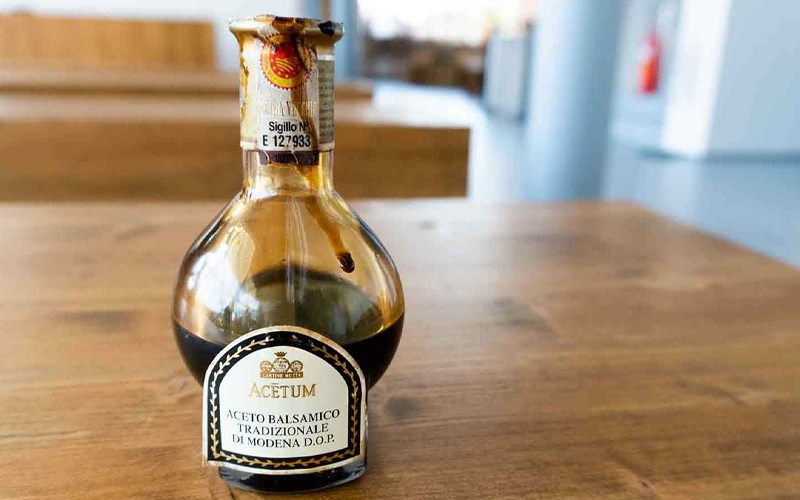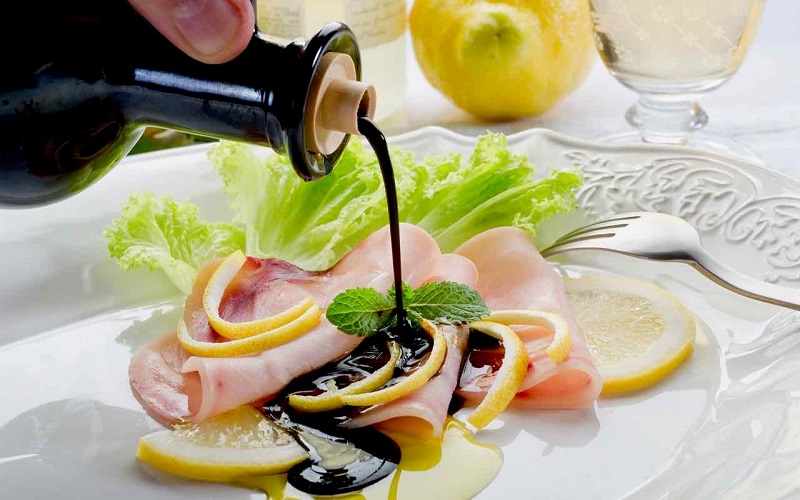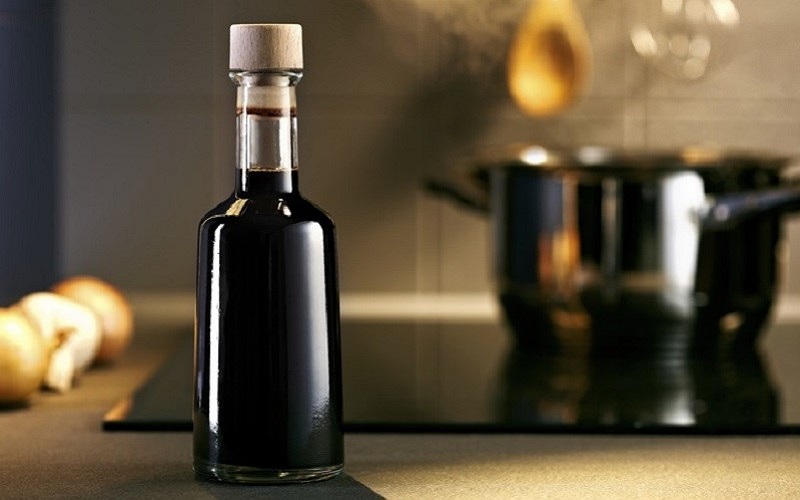Balsamic vinegar is a type of vinegar produced through the fermentation of grapes and is known for its multitude of beneficial uses in our daily lives. Let’s explore what balsamic vinegar is, its unique flavor profile, and its effects on our health and culinary creations.
1 What is Balsamic Vinegar and What Does it Taste Like?
 Balsamic vinegar is a grape-fermented vinegar with a deep brown color
Balsamic vinegar is a grape-fermented vinegar with a deep brown color
Balsamic vinegar is a distinctive vinegar derived from grapes, characterized by its deep brown color. It is an essential ingredient in Italian cuisine and is commonly used in sauces and salad dressings. The versatile condiment adds a unique touch to various dishes.
The production of balsamic vinegar involves a careful fermentation process that can take up to 12 years, during which the vinegar undergoes multiple stages to develop its characteristic flavor and aroma.
In terms of taste, balsamic vinegar boasts a distinctive sour flavor with subtle sweet notes when refined. Traditionally produced balsamic vinegar achieves its natural sweetness through the addition of honey during the fermentation process.
2 How Much Does Balsamic Vinegar Cost? Why is it So Expensive?
 The intricate and laborious production process of balsamic vinegar contributes to its high price tag
The intricate and laborious production process of balsamic vinegar contributes to its high price tag
Balsamic Vinegar Pricing
There are two types of balsamic vinegar available in the market: industrially produced vinegar and traditionally crafted vinegar, each with its own price point.
The industrially produced variety typically costs around 100,000 VND per 500ml bottle.
On the other hand, the traditionally crafted balsamic vinegar, aged in wooden barrels for approximately 12 years, has a price tag of around 100 USD per 100ml bottle. The longer the aging process, such as 15 years, the higher the price, reaching up to 400 USD per 100ml.
Why is Traditional Balsamic Vinegar So Expensive?
The intricate and labor-intensive production process of traditional balsamic vinegar justifies its high cost. The time-honored craft requires meticulous attention to detail and a significant amount of time and effort from the vinegar makers.
Additionally, the specific type of grapes used (white grapes such as Lambrusco and Trebbiano, harvested late in the season) undergo a complex transformation before being aged in wooden barrels for several years. During this aging process, the vinegar is transferred between different barrels to impart unique flavors and characteristics.
The lengthy aging process, ranging from 12 to 18, 25, 30, or even 40 years, is a significant factor in the high price of traditional balsamic vinegar. However, despite the cost, many are willing to invest in this exquisite condiment due to its remarkable health benefits and culinary applications.
3 Health Benefits of Balsamic Vinegar
Reduces Cholesterol Levels
 Balsamic vinegar helps maintain and reduce cholesterol levels in the blood
Balsamic vinegar helps maintain and reduce cholesterol levels in the blood
One of the standout health benefits of balsamic vinegar is its positive impact on cholesterol levels. Balsamic vinegar contains acetic acid, which aids in detoxifying the body and increasing HDL (good) cholesterol. Incorporating balsamic vinegar into your diet can help maintain healthy cholesterol levels.
Supports Digestive Health
 Balsamic vinegar aids in improving digestive functions
Balsamic vinegar aids in improving digestive functions
The acetic acid in balsamic vinegar not only helps preserve food but also promotes a healthy digestive system. Additionally, it provides beneficial probiotics that enhance gut health and boosts the immune system with its rich antioxidant content.
Assists in Weight Loss
 The presence of probiotics in balsamic vinegar contributes to a feeling of fullness, aiding in weight loss
The presence of probiotics in balsamic vinegar contributes to a feeling of fullness, aiding in weight loss
Similar to other types of vinegar, balsamic vinegar is a valuable ally in weight loss journeys. The probiotics found in balsamic vinegar induce a feeling of fullness, curbing appetite and supporting weight loss efforts.
Diabetes-Friendly
 Consumption of balsamic vinegar helps prevent sudden spikes in blood sugar levels
Consumption of balsamic vinegar helps prevent sudden spikes in blood sugar levels
Research conducted in 2006 revealed that consuming balsamic vinegar can prevent sudden increases in blood sugar levels after meals. This characteristic makes balsamic vinegar a favorable option for individuals with diabetes, helping to manage their blood sugar levels effectively.
Improves Blood Circulation
 The high polyphenol content in balsamic vinegar contributes to improved blood circulation
The high polyphenol content in balsamic vinegar contributes to improved blood circulation
Rich in polyphenols, balsamic vinegar helps prevent platelet aggregation in the blood, thereby reducing the risk of cardiovascular diseases. This health benefit has led to the widespread use of balsamic vinegar in the Mediterranean region, where it is valued for its therapeutic and anti-aging properties.
Promotes Cardiovascular Health and Stable Blood Pressure
 Balsamic vinegar offers cardiovascular benefits and positively impacts blood pressure
Balsamic vinegar offers cardiovascular benefits and positively impacts blood pressure
In addition to its cardiovascular benefits, balsamic vinegar has been scientifically proven since 2001 to have a positive influence on blood pressure.
Enhances Skin Health
 Balsamic vinegar contributes to healthier and brighter skin
Balsamic vinegar contributes to healthier and brighter skin
Beyond its internal health benefits, balsamic vinegar is also renowned for its positive impact on skin health. The presence of acetic acid, antioxidants, and antibacterial properties in balsamic vinegar enhances skin health and promotes a radiant complexion. While it is not commonly applied directly to the skin due to its strong color and scent, incorporating balsamic vinegar into your diet can improve skin conditions, including acne.
Culinary Enhancer
 Balsamic vinegar serves as a versatile culinary enhancer
Balsamic vinegar serves as a versatile culinary enhancer
One of the most valuable applications of balsamic vinegar is its use as a culinary enhancer. It pairs exceptionally well with salads, stir-fries, grilled dishes, and various sauces. Additionally, balsamic vinegar can be combined with olive oil for bread dipping or used as a marinade for grilled meats and stir-fries. It also adds a unique twist to stews and soups.
4 Delicious Recipes Using Balsamic Vinegar
 Balsamic vinegar is commonly used in sauces and as a flavor enhancer in various dishes
Balsamic vinegar is commonly used in sauces and as a flavor enhancer in various dishes
Balsamic vinegar is a versatile ingredient in the kitchen, often used as a flavor enhancer in a variety of dishes. Globally, upscale restaurants and hotels frequently incorporate balsamic vinegar into European and Mediterranean-style dishes, particularly those inspired by Italian cuisine.
Balsamic vinegar is commonly blended into sauces for stir-fried dishes such as salmon or premium beef. It can also be combined with olive oil for bread dipping or used as a marinade for grilled meats. Additionally, balsamic vinegar adds a unique twist to stews and soups.
5 How to Store Balsamic Vinegar
 Store balsamic vinegar in a cool, dry place, away from direct sunlight
Store balsamic vinegar in a cool, dry place, away from direct sunlight
Given that traditional balsamic vinegar is typically aged for a minimum of 12 years, it is inherently resistant to oxidation. To preserve its quality, store balsamic vinegar in glass bottles or jars, tightly sealed to prevent air exposure.
Additionally, maintain the vinegar in a cool, dry place, away from direct sunlight and extreme temperature fluctuations. These storage conditions will help retain the original flavor and quality of the vinegar.
6 Where to Buy Balsamic Vinegar
 Balsamic vinegar is available at supermarkets and specialty stores
Balsamic vinegar is available at supermarkets and specialty stores
Balsamic vinegar can be purchased from supermarkets and specialty stores offering imported goods. Given its premium price, it is essential to select a reputable retailer to ensure the authenticity and quality of the product.
In conclusion, balsamic vinegar is a valuable addition to your pantry, offering a multitude of health benefits and culinary applications. Incorporate it into your meals to elevate your dining experience and support your overall well-being.





































